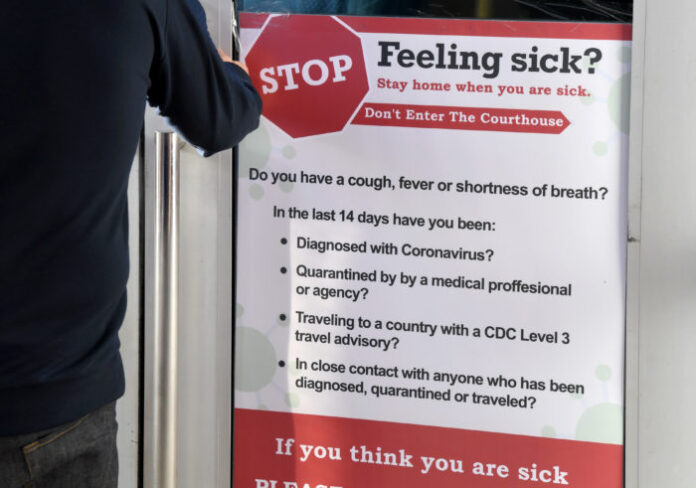The spread of the novel coronavirus (COVID-19) has sparked conversations among employers concerned about the wellbeing of their teams. Here are some common questions employers are asking during this outbreak, which has been deemed a pandemic by the World Health Organization.
Can employees be restricted from traveling to impacted countries?
At this point, there have been numerous countries around the world impacted by the coronavirus. While employers can limit business travel or cancel company events, employees who plan to travel for personal reasons cannot be restricted from doing so. That said, as an employer, you may ask employees to notify you prior to any overseas travel. Furthermore, you may be able to take additional steps to ensure the safety of everyone who is employed at your facility, such as implementing a work-from-home policy or other limited staffing plan.
Read more from HRE on coronavirus
You have the right to restrict an employee’s ability to return to work if you follow all legal requirements for doing so. You cannot request that an employee provide a medical diagnosis. If you are unsure about your HR policies, talk to a lawyer.
Can I legally restrict visitors to the workplace amid coronavirus concerns?
While you likely have the right to insist that anyone who has a fever or flu symptoms not visit your work facilities, it is advisable to ensure that any such policy is applied uniformly across all demographic groups. This includes contractors, vendors and visitors. A posted policy should be visible to anyone entering your facility. You may wish to consider a hand-held temperature-screening device, provided the use of such a device is legal in your state. A local lawyer can help you determine what is legal and appropriate in your specific situation.
RELATED A collection of strategies to manage coronavirus in the workplace
Does FMLA apply to employees who need to take off due to coronavirus illness?
If the Family and Medical Leave Act of 1993 (FMLA) guidelines apply to your business, employees may have leave benefits available to them. The reason the coronavirus likely qualifies is that it is classified as a “serious health condition.” Keep in mind, this may also apply if the employee requires time off to care for an immediate family member.
It is important to note that there may also be state laws that apply, especially for those companies that aren’t subject to FMLA. A local attorney can explain which laws apply to your business.
Would my company be liable if an employee contracts coronavirus at work?
Employees who contract coronavirus on the job, particularly healthcare workers, may be entitled to collect workers’ compensation. Because of this, employers may be responsible for covering medical bills associated with the disease if an employee becomes ill due to contact with someone in the workplace. You may need to ensure you have spoken with a medical professional to assist you in determining if there is a relationship between the job and the employee being stricken with the virus.
Employees may also be entitled to disability payments if such benefits are part of your overall benefits plan. Make sure you have verified any limits on coverage and plan for any resources you may need to administer the program. Your insurance-plan provider may have additional guidance.
Lastly, employers should always seek to reduce potential tort claims by following commercially reasonable practices. For example, if a particular geographic area or industry is affected disproportionately by illness, employers may collectively take extraordinary measures. It’s probably not a good idea to be the outlier in that case.
Do I need to pay an employee who misses work due to being quarantined?
Whether an employee must be paid during quarantine will depend, in large part, on the benefits that you offer in relation to sick leave and applicable law (like FMLA). If you have workers who are exempt and they show up for work during any given week and you send them home, you may still be required to pay them for the entire work week. Employees who have a specific number of sick days and/or personal days may also elect to use those benefits during a period they are quarantined.
This is a good time to review your current benefits offering and see how many employees have accumulated paid sick and personal leave time. Having this information can be helpful to ensure your business is not negatively impacted in the event numerous employees opt to take time off during a potential outbreak or threat to their health in the workplace.
It is also important to note that your state may have its own “sick leave” law that applies. An employment lawyer can help you determine if your policy meets the legal standards in your state.
How can I communicate my global health-emergency policy as an employer?
Your company emergency policies should be clearly spelled out in your Employee Handbook. This can help ensure that employees at all levels understand what steps you believe will keep your workplace safe for everyone.
While your HR policies should ideally always be up-to-date, this is a great time to review all of the HR documents your company uses. It is always a good idea to work with a lawyer when drafting or revising human resources policy.
Ensuring that employees practice regular hand washing and that your facilities are properly cleaned may also help curb potential spreading of the virus. In order to help your team feel safe, keep hand sanitizer and disinfectant on hand, and ensure that your restrooms are stocked with the appropriate soap, towels and toiletries. Additional guidance for businesses and employers can be found through the Centers for Disease Control & Prevention.
Charley Moore is an attorney and founder/CEO of Rocket Lawyer.



